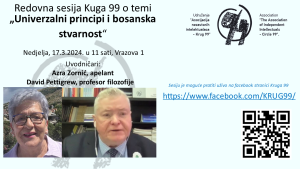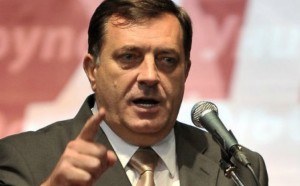COUNTERING HYBRID ACTIVITY AGAINST BOSNIA AND HERZEGOVINA

| Krug 99 – Circle 99 Sarajevo, Bosnia and Herzegovina Summary of Session of 12 November 2023 – 46 COUNTERING HYBRID ACTIVITY AGAINST BOSNIA AND HERZEGOVINA Hybrid activity (warfare) is defined as the process of using kinetic and non-kinetic aggressive methods, or their collective activity. The most illustrative example of this is Russian hybrid warfare against Ukraine. Prior to the deployment of Russian armed forces to Crimea, the Russians used other non-military measures, such as political maneuvering over gas pipelines, bribing politicians and providing support to far-right and far-left organizations with radical agendas. For example, the Putin regime characterized the Majdan protests in Kiev in favor of joining the European Union as a “fascist conspiracy.” The Russian Federation, or actually the Putin regime, through the use of hybrid activity (such as during the occupation of Crimea in 2014), did not in the end succeed in halting Ukraine’s move toward closer relations with the EU and NATO. But in February of 2022 this country launched its aggression against the internationally recognized and sovereign state of Ukraine. Over the past few years, aiming to distract attention from its aggression against Ukraine, the Putin regime has undertaken intensive hybrid operations against the Western Balkan countries, primarily against Kosovo, North Macedonia, Montenegro and Bosnia. Moscow’s goal is to ensure that Bosnia does not continue on its path to membership in the EU and NATO. After the Russian Federation’s aggression in Ukraine, some very serious and significant hybrid operations have been identified as being conducted against Bosnia and its neighbors, especially in the strengthening of propaganda activities in the context of the crisis in the Middle East and Israel’s expulsion and massacre of Palestinians in Gaza. Certain Bosnian officials and many civil associations have strongly condemned Hamas’s terrorist attack of October 7, 2023 against civilian and military (IDF) targets in Israel. Nevertheless, certain media outlets in the Republlika Srpska entity, as well as in Serbia, Croatia, Italy and Austria, have sometimes subtly sometimes rather openly warned against potential terrorism on the part of so-called “terrorist cells in Bosnia and Herzegovina.” In this way, Bosnia has been targeted as a “source of instability in Europe.” A recent interview of the President of Repubilka Srpska Milorad Dodik in the Zagreb magazine “Nacional,” prompted further concern among the citizens of Bosnia and of others in the Western Balkan region. Among other things, he predicted that “as soon as Republika Srpska declares its independence, it will be recognized by 15 countries, while Croatia will at first wait but then recognize us later.” In a similar vein, Republika Srpska representatives in Bosnian Parliament sent a letter to U.S. Congress which complained that “Bosnia has for some time already been a refuge for radical Islamists, that the nationalistic politics of the largest Bosnjak parties confirm their intention to rule Bosnia without Serbs and Croats and that parts of Bosnia lived in mainly by Bosnjaks continue to be the site of numerous Al-Kaida and ISIS sleeper cells.” This is nothing more than a renewal of the old propaganda mantra of convicted war criminals Ratko Mladic and Radovan Karadzic, as well as followers of the policies of [wartime Croatian President] Franjo Tudjman, concerning the dangers of “Islamic extremism and terrorism” and ‘Europe needing to be protected” because of Bosnia. But this narrative lacks any relevant factual basis, or fact-based domestic or international examination. Besides, all of the aforementioned former officials were convicted of genocide or participating in a collective criminal enterprise during the international armed conflict in Bosnia of the 1990s. This represents the clear danger, threat and open intention to return to these previous policies, the only difference being the changed geopolitical circumstances. Potential measures and activities to counter hybrid activities against the Bosnian state are the following: 1. In order for Bosnia and Herzegovina and its political and security institutions to counter hybrid warfare, the intelligence agencies of Bosnia should immediately form a Division for Countering Hybrid Operations on the model of such offices in EU countries. The Division would employ professional analysts and specialists from the “OSA” (Intelligence Agency of Bosnia), security experts from the academic community, professionals from the Bosnian Investigative Agency (“SIPA”), the Border Police and other law enforcement agencies. The Division would provide continuing analyses of hybrid threats coming from neighboring and other countries, as well as threats from within the Bosnian state. 2.All competent institutions and procedures should continue to be used to eliminate disruptive factors from the political scene, including promoting criminal indictments and juridical investigations of supporters of separatist and irredentist activity and those provoking religious and ethnic hatred at all levels. A good example would be the current process in Bosnian courts against the President of the Republika Srpska entity because of his refusal to implement decisions of the High Representative in Bosnia and Herzegovina, a process launched by the Bosnian Prosecutors Office. 3. In order to deter aggressive threats from neighboring and other countries, Bosnia should develop a strong, technologically modern and professionally staffed defense and security complex at the Cantonal level and other levels of authority. The efforts of Cantonal governments should be strengthened in the domain of defense and security capabilities. The Cantons should be able to set up independent or collective helicopter units necessary for carrying out various emergency activities. 4. In order to mount an effective countering of hybrid operations from neighboring and other countries, members of the diplomatic and consular missions of Bosnia and Herzegovina abroad should identify as many regional and international foreign governments as allies as possible. 5. Finally, a special priority would be developing the sensitivity and mobilization of the citizens of Bosnia and Herzegovina to meet the challenges of hybrid activities. *** The presenter was Dr. Ahmed Kico, specialist in security issues ** Adil Kulenovic, President of “Circle 99” (“Krug 99”) |
| Association of Independent Intellectuals – Circle 99 (Bosnian: Krug 99), a leading Bosnian think-tank, was established in Sarajevo in 1993, in the midst of the Bosnian war (1992-1995), while the capital was under siege. Circle 99 provides a platform to bring together intellectuals of various professional and ethnic identities; university professors, members of the Academy of Sciences and Arts of Bosnia and Herzegovina, artists, journalists, entrepreneurs, diplomats, and other prominent figures from Bosnia and from abroad. Multidisciplinary discussions and initiatives are held each Sunday throughout the academic year, in the form of regular sessions about politics, science, education, culture, economy, and other societal issues. The overall goal is to sensitize the public towards a democratic transformation, achieving and maintaining peace, and integration of modern Bosnia into the community of countries fostering liberal democracy. Circle 99 has been declared an organization of special significance for the city of Sarajevo. |







